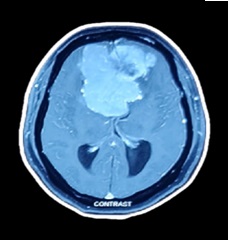From Psychiatric Mystery to Medical Miracle: The Tumor That Stole Her Personality
NewsTeam7/6/2024
Bengaluru – The importance of timely diagnosis and appropriate treatment of brain tumors cannot be overstated. A recent case at Aster RV Hospital underscores this critical message, demonstrating how early intervention can restore a patient’s quality of life and bring relief to their loved ones.
Patient Radhika (name changed), a 47-year-old woman, presented with a variety of concerning symptoms over several months. Initially, she experienced memory impairment, mood changes, and reduced speech output, which her husband noticed. She also suffered from hallucinations, weight gain, and excessive sleep. Additionally, Radhika had been experiencing intermittent headaches and urinary incontinence for six months. These symptoms led her to consult a psychiatrist, who realized that her condition was not psychiatric in nature. She was then referred to a neurosurgeon for further evaluation.

An MRI revealed a large tumor, measuring 7 to 8 centimeters, originating from the meninges, the protective covering of the brain. This meningioma was exerting pressure on the frontal lobes of her brain, leading to a condition known as bi-frontal dysfunction. The frontal lobes are crucial for executive functions and decision-making, and their impairment can result in significant personality changes and psychiatric symptoms.
“My wife had low mood, urinary incontinence (loss of bladder control), reduced speech output, looking aloof, not talking with people, associated with memory impairment and headache. She was in this condition for 6 to 8 months when she approached the hospital. She also had visual deterioration in one of the eye and she was behaving abnormal and was not the same person what she was. We thought that there was something abnormal in her behaviour and took her to a psychiatrist thinking that the patient could be suffering from depression or some other psychiatric illness. However, she was evaluated by the psychiatrist that her condition was due to an organic cause and was referred to us at the Neuro-surgery department. The MRI was suggested and it was revealed in the MRI that it was a tumor pressing on the frontal lobes of the brain”, said Radhika’s Husband.
Dr. Aniruddha Tekkatte Jagannatha, Consultant - Neurosurgery, Aster RV Hospital, explains, “The frontal lobes are one of the largest and most developed parts of the human brain, responsible for executive decisions and behavior regulation. Dysfunction in this area due to tumors like meningiomas or gliomas can lead to psychiatric symptoms such as mood changes, abnormal behavior, and personality alterations. These symptoms are often misdiagnosed, delaying the correct treatment.”
Radhika underwent a successful bifrontal craniotomy, guided by navigation and tumor fluorescence technology, allowing for complete excision of the tumor. Remarkably, within one week of the surgery, she returned to her normal self, much to the relief and joy of her family.
“The early detection and diagnosis of brain tumors, followed by a comprehensive treatment plan, are crucial for managing these conditions effectively,” emphasizes Dr. Aniruddha. “Our patient’s case illustrates how timely medical intervention can lead to significant improvements in health outcomes, enabling patients to regain their normal lives.”
With the advances in Neurosurgery, techniques and technology, nowadays, brain tumor surgeries are becoming less complicated. The Intra operative adjuncts like neuro-navigation, tumor fluorescence, microscopes and intraop neuro monitoring makes these brain tumor surgeries safe wherein only the tumor is removed and the surrounding healthy brain parenchyma is saved so that the patient can get back to normal life at the earliest. What was very interesting about this surgery was, we at the hospital made use of expertise in latest technologies like Neuro-navigation, which is a kind of GPS for the Brain. State of the art technology Tumor florosence, cortical mapping and intarop neuromonitoring which helps in saving important parts of the brain and removing only the tumor and not cuasing any brain dysfunction during the surgery.
Most of the times when patients with benign tumors like meningiomas undergo successful complete removal, will lead a healthy normal life. However, long term follow-up with your neuro surgeron is a must
Radhika’s successful treatment and recovery highlight the critical need for awareness, early diagnosis, and specialized care in managing brain tumors. Her case serves as a powerful reminder of the life-saving impact of timely medical intervention.